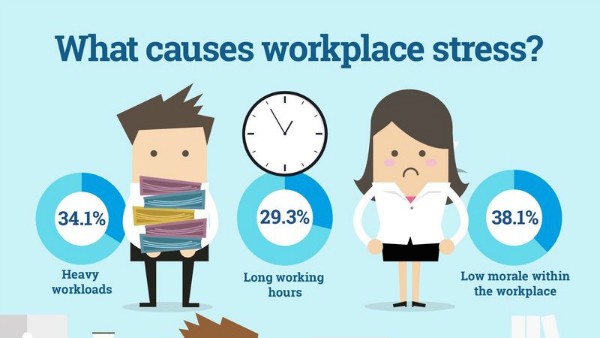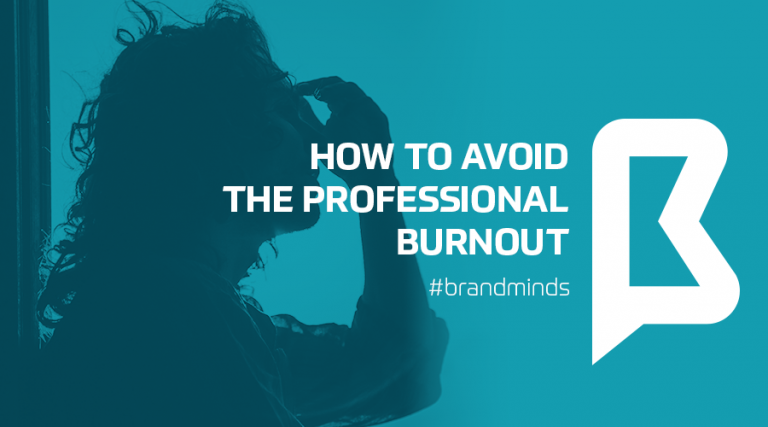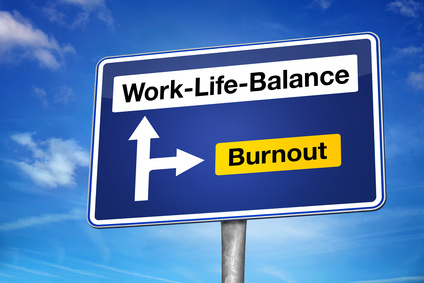Employees stress – causes, business costs and what to do to prevent it
Your employees are your most valuable resource and your company’s greatest asset. As a leader or business manager, their well being must be one of your top interests.
Stressed employees means high costs for your business
High levels of workplace-related stress affects your employees’ well being. And having stressed employees is also taking a toll on your business.
Here are the costs on your business:
- Decline in productivity and performance;
- Decline in employee health;
- High employee turnover rates;
- Frequent absenteeism;
- Legal costs;
- Increased training and recruitment costs;
- Low morale.
Research shows that 60 percent of workers suffer from work-related stress that costs U.S. businesses $30 billion a year in lost workdays.
Are your employees stressed? If your answer is No, how do you know they’re not stressed? Asking them if they’re stressed is not a reliable option because they may not tell you the truth in fear of being fired.
Are your employees stressed? Find out!
Ask yourself these 6 questions to find out if your employees might be stressed and they’re not telling you:
- Are your team members constantly missing lunch to get work done?
- Does your staff often take work home after hours?
- Is their work often rushed? Have they made many mistakes lately?
- Do they seem overly emotional, edgy or irritable?
- Notice anyone’s attention levels fading during meetings?
- Has anyone’s physical appearance changed for the worst?
Employee stress – top 3 causes

image source: relaxlikaboss.com
Here are the top 3 causes for employee stress:
- Bad managers
Have you heard the saying Employees leave bosses, not companies?
Well, it’s true.
What is a bad boss?
Here are 4 kinds of bad managers according to Brigitte Hyacinth, author of The Future of Leadership: Rise of Automation, Robotics and Artificial Intelligence:
- Marionette or Yes man
The Yes men are the managers that play safe to preserve their position and privileges by following orders. They never stand up for their team or question policies.
- King Kong
The King Kongs of the business world are the managers that quickly forget where they came from once they reached to the top. How can you recognise them? They talk down to their employees and feel superior to them.
- Superman
This kind of managers is the solo-flyer: they make decisions all by themselves, disregarding the input of their team and taking the credit. Even Superman fought alongside his Justice League super-hero colleagues.
- Taskmaster
This breed of managers takes micromanaging to the highest level: they suffocate and demoralise their employees, killing all creativity.
- Heavy workloads
Workload is the second cause of stress for employees.
If your employees need to do overtime or take their work home, than they may be struggling with heavy workloads and you may soon face employee burnout.
You can prevent your employees from being overworked by using project management tools. These tools help you control the workload of each employee and avoid burnout:
Stop losing money with these 3 project management tools.
- Long working hours
Employees who work more than 40 hours a week are under the impression they are getting more done.
They are wrong.
In fact, research has shown that working overtime leads to:
- Reduced productivity;
- Increased fatigue;
- Higher safety risks;
- Neglected social and family life;
- More stress;
- Increased risks of heart disease.
How to keep your employees stress-free
Here are 6 recommendations to prevent employee stress:
-
Offer a flexible work environment:
Flexible work environment doesn’t refer only to working from home instead of your office.
Here are 4 flexible work strategies, and some of the companies that employ them:
- unlimited vacation: LinkedIn, Evernote
Unlimited vacation means your employees can take vacation time whenever they need it. This strategy can fit well in an organization that operates on mutual respect and trust.
- results-only: MindTools
The results-only concept means that team members are measured by performance, results, or output rather than physical presence in an office or number of hours worked.
- remote-work: Sqwiggle
The ability to work remotely is the perfect fit for organisations that employ young parents. Parents can opt to stay at home to co-participate in household and childcare obligations.
- job-sharing: Qualcomm
Job-sharing means two professionals forming a partnership to perform one job. This work strategy is one of the most common ways for specialised professionals to create the time needed to care for their personal needs in addition to performing excellent work.
-
Nurture a company culture focused on open communication
Kit Pang, Communication Expert and founder of BostonSpeaks states that communication is the key to building a positive company culture.
To achieve open communication, he recommends giving the employees the power to speak up. Companies should engage in two-way conversations at all levels, giving the employees the ability to point out a problem or present an idea and be heard.
-
Nurture and support the growth of good leaders
As research has found, leaders are made, not born. The secret is to teach employees how to shift from a fixed mindset to a growth mindset.
Employees with a growth mindset drive innovation and support the company’s struggle to overcome industry changes.
Managers with a growth mindset inspire their employees to seek constant improvement and developing of skills.
Find out how to change your mindset: Do you have a growth mindset?
All You Need To Know About The 5 Second Rule
Making decisions is always hard and, most of the times, we tend to think and re-think them over and over again. It seems like the famous speaker and influencer Mel Robbins has an easy answer to our problems, in her book “The 5 Second Rule”, that “simply” requires you to make a decision in five seconds. Therefore, when an opportunity arises, you mustn’t think too much about it, just count down from 5 to 1 and decide.
The technique helps you avoid procrastination and get over your fear of making a bad choice. “5-Second Decisions do not allow your brain to be involved and it all comes from your heart combined with your instinct. If you wait longer than 5-seconds, you’ll talk yourself out of making the decision. The 5-Second Rule is a bias towards action instead of overthinking and been taken over by fear. In that 5 seconds, you get the opportunity to be courageous. It’s a small window of courage that you can access for free. After 5 seconds, your days are numbered and your brain will sabotage you,” wrote Tim Denning for medium.com.
Still, as liberating as it might be the rule, one should take some steps before jumping into it:
Get yourself in the habit of being courageous
What does represent more precisely? Make sure you know exactly what you are getting yourself into and start taking small, courageous, everyday actions for the week leading up to the negotiation.
NO is still very powerful and you can use it
“The most difficult part of the negotiation process is knowing when you walk away. Overthinking the decision in haste will lead to accepting an offer that may be below your value and the long-term value of your professional contributions,” wrote entrepreneur.com.
Admit that you are stressed out
According to inc.com, you shouldn’t analyze or dissect it. Just accept that what you’re dealing with is not a fault, defect, or inability in you but a reaction to stress. It’s real, and it’s driving your decisions. That takes a bit of the pressure off and enables your prefrontal cortex to play a role in the next decision.
How To Avoid The Professional Burnout

When one is passionate about their job, when one is a high-achiever, one tends to ignore the fact that they’re working exceptionally long hours, taking on exceedingly heavy workloads and putting enormous pressure on themselves to excel—all of which make them ripe for burnout.
According to psychologytoday.com, burnout is a state of chronic stress that leads to: physical and emotional exhaustion, cynicism and detachment, feelings of ineffectiveness and lack of accomplishment. In the state of full-fledged burnout, one is no longer able to function effectively on a personal or professional level. However, burnout doesn’t happen overnight, our bodies and minds do give us warnings, and if you know what to look for, you can recognize it before it’s too late. More about the stages of a burnout and its signs one can read here.

But what can we do to avoid reaching this state? According to Christina Maslach and Michael P. Leiter in their book “The Truth About Burnout: How Organizations Cause Personal Stress and What to Do About It”, when burnout occurs, three things happen: you become chronically exhausted, cynical and detached from your work and you feel increasingly ineffective on the job.
An idea would be to try and be more optimistic and make sure you don’t fall on a pessimistic slide, or, if you have the necessary means, just try a vacation. Realistically speaking though, things are not as easy as they seem, hence the problem creeping out on you and making it quite a big issue.
Pay attention to the voice in your head. When it starts describing negative events as permanent, pervasive or personal, correct yourself. By remembering the 3 P’s (permanence, pervasiveness and personal) and flipping the script, Martin Seligman, author of “Learned Optimism: How to Change Your Mind and Your Life” says you can make yourself more optimistic over time.
Increase your social activity. Spend time with friends, they will bring a balance into your life. As shown by bakadesuyo.com, when the American Medical Association surveyed top doctors to find out how they avoided burnout, one of the key things mentioned was “sharing issues with family and friends.”
Increase your self-efficiency. Paula Davis-Laack, JD, MAPP, an internationally-published writer who travels the globe as a stress and resilience expert, wrote for Psychology Today that self-efficacy is having the belief in your own ability to accomplish (and exercise control over) personally meaningful goals and tasks. People who have a stronger level of perceived self-efficacy experience less stress in challenging situations, and situations in turn become less stressful when people believe they can cope (Albert Bandura, 1989).
Have creative outlets. Burnout interferes with your ability to perform well, increases rigid thinking, and decreases your ability to think accurately, flexibly, and creatively. Even if you aren’t able to flex your creative muscles at work, having some type of creative outlet will keep you engaged and motivated.
Take care of yourself. Make sure you always put yourself first and don’t forget what is important to you and your life. Moreover, pay attention to your health and the outside-work life. Our bodies aren’t machines and one has to remember that things will still be here to be done after taking a much-needed break.
Start saying “no” from time to time. Don’t be afraid to say no. Every “yes” you say adds another thing on your plate and takes more energy away from you.

Get support where you can find it. The number of people who say they have no one with whom they can discuss important matters has nearly tripled in the past two and a half decades. The more depressed or into-work people get, the more they tend not to speak with other people or spend time with others, considering they are always under-time pressure or with a deadline hanging over their head. It’s a state one must make sure he / she doesn’t get stuck into.
According to http://99u.com, to help relieve pressure, schedule daily blocks of downtime to refuel your brain and well-being. It can be anything from meditation to a nap, a walk, or simply turning off the wifi for a while.
Concentrate on positive emotions. Studies show that increasing your diet of positive emotion builds your resilience, creativity and ability to be solution-focused, things that are in short supply if you feel like you’re burning out. I made it a point to start noticing when people did things well (and told them so), and I tried to stop being so hard on myself. Aim for a ratio of positive emotions to negative emotions of at least 3:1, which is the tipping point to start experiencing increased resilience and happiness (Fredrickson, 2009).
Limit your contact with negative people. Hanging out with negative-minded people who do nothing but complain will only drag down your mood and outlook. If you have to work with a negative person, try to limit the amount of time you have to spend together.
Make friends at work. Having strong ties in the workplace can help reduce monotony and counter the effects of burnout. Having friends to chat and joke with during the day can help relieve stress from an unfulfilling or demanding job, improve your job performance, or simply get you through a rough day.
Take time off. If burnout seems inevitable, try to take a complete break from work. Go on vacation, use up your sick days, ask for a temporary leave-of-absence—anything to remove yourself from the situation. Use the time away to recharge your batteries and pursue other burnout recovery steps. Entrepreneurs or freelancers can be especially prone to burnout. Joel Runyon plays “workstation popcorn,” in which he groups tasks by location and then switches, in order to keep work manageable, provide himself frequent breaks, and spend his time efficiently.

Set boundaries. Don’t overextend yourself. Learn how to say “no” to requests on your time. If you find this difficult, remind yourself that saying “no” allows you to say “yes” to the things that you truly want to do.
Nourish your creative side. Creativity is a powerful antidote to burnout. Try something new, start a fun project, or resume a favorite hobby. Choose activities that have nothing to do with work.
Set aside relaxation time. Relaxation techniques such as yoga, meditation, and deep breathing activate the body’s relaxation response, a state of restfulness that is the opposite of the stress response.
Get plenty of sleep. Feeling tired can exacerbate burnout by causing you to think irrationally.
Avoid nicotine. Smoking when you’re feeling stressed may seem calming, but nicotine is a powerful stimulant, leading to higher, not lower, levels of anxiety.


